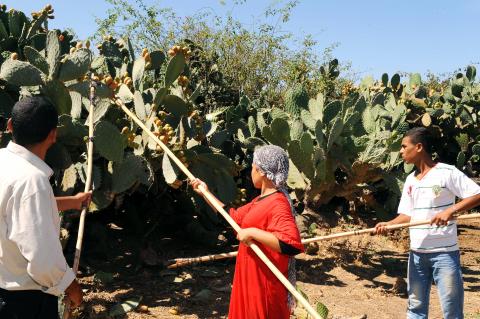Barbary fig oil, celebrated as an effective anti-ageing skin potion, is following argan oil as a great new cosmetic export from Morocco.
However, the tiny amount of oil extracted from each cactus fruit makes Barbary fig oil the most expensive on the market, about 1,000 euros (US$1,440) a liter.
Beyond its cosmetic virtues, the UN is urging Morocco to develop the plant in a country where 80 percent of farming is carried out in arid or semi-arid regions.

Photo: AFP
The push to develop Barbary fig, a cactus fruit well-adapted to extreme weather conditions, comes with a belief that several revenue streams could stem from it. If successful, the cactus could stand as a business model to other countries looking for cash crops suitable to inhospitably hot climates.
Eight tonnes of the Barbary fig fruit — sometimes known as prickly pear — are needed to produce a liter of oil used for cosmetics, said Karim Anegay, head of the cactus program at the economic promotion office for southern Morocco.
“This oil is commercialized by Moroccan companies as its anti-ageing virtues are of excellent quality, but it’s still early days,” he said.
In Casablanca, cosmetics company Azabane uses Barbary fig oil in shampoo and creams.
Redouane Stouti, a 27-year-old entrepreneur, owns a farm in the Errhamana region, where he produces 10 liters a month from his vast plantation.
“With the help of a machine, the fruit seeds are pressed as is,” he said.
“I have 20 points of sale in Morocco under the ‘Coeur de Figue’ appellation,” he said as he toured a series of alleys where about 30 women were picking the thorny fruit.
Researcher Mohammed Boujnah said the oil was “rich in Vitamin E with a great anti-oxidant power.”
Sofia, a 50-year-old customer, said the oil was “wonderful.”
“Ever since I’ve used it I’ve seen an improvement and elasticity in my skin,” she said.
In the Gulemim and Sidi Ifni regions, both extremely arid, Morocco began an ambitious program to increase cactus production.
The UN Development Programme contributed US$1.7 million to the program and provided technical assistance, said program director El Kebir Alaouoi M’Daghri.
Annual production of Barbary fig fruit in Morocco is 1.2 million tonnes from 150,000 hectares of plantations, mostly in southern regions.
Originally imported from the Americas in the 16th century, the cactus and its fruit are used traditionally, often as food. Orangish-red when ripe, the fruit’s juicy insides taste something like a very sweet watermelon.
UN experts say the fruit can even be used as sustenance during famines.
In southern regions, “conventional farming can no longer provide added value and that is why we have found cactus cultivation as an alternative,” M’Daghri said.
The Sidi Ifni Province recently held a festival to promote the cactus fruit and the UN-backed program is currently building installations to improve production of Morocco’s latest agricultural initiative.

Taiwan’s long-term economic competitiveness will hinge not only on national champions like Taiwan Semiconductor Manufacturing Co. (TSMC, 台積電) but also on the widespread adoption of artificial intelligence (AI) and other emerging technologies, a US-based scholar has said. At a lecture in Taipei on Tuesday, Jeffrey Ding, assistant professor of political science at the George Washington University and author of "Technology and the Rise of Great Powers," argued that historical experience shows that general-purpose technologies (GPTs) — such as electricity, computers and now AI — shape long-term economic advantages through their diffusion across the broader economy. "What really matters is not who pioneers

In a high-security Shenzhen laboratory, Chinese scientists have built what Washington has spent years trying to prevent: a prototype of a machine capable of producing the cutting-edge semiconductor chips that power artificial intelligence (AI), smartphones and weapons central to Western military dominance, Reuters has learned. Completed early this year and undergoing testing, the prototype fills nearly an entire factory floor. It was built by a team of former engineers from Dutch semiconductor giant ASML who reverse-engineered the company’s extreme ultraviolet lithography (EUV) machines, according to two people with knowledge of the project. EUV machines sit at the heart of a technological Cold

TAIWAN VALUE CHAIN: Foxtron is to fully own Luxgen following the transaction and it plans to launch a new electric model, the Foxtron Bria, in Taiwan next year Yulon Motor Co (裕隆汽車) yesterday said that its board of directors approved the disposal of its electric vehicle (EV) unit, Luxgen Motor Co (納智捷汽車), to Foxtron Vehicle Technologies Co (鴻華先進) for NT$787.6 million (US$24.98 million). Foxtron, a half-half joint venture between Yulon affiliate Hua-Chuang Automobile Information Technical Center Co (華創車電) and Hon Hai Precision Industry Co (鴻海精密), expects to wrap up the deal in the first quarter of next year. Foxtron would fully own Luxgen following the transaction, including five car distributing companies, outlets and all employees. The deal is subject to the approval of the Fair Trade Commission, Foxtron said. “Foxtron will be

INFLATION CONSIDERATION: The BOJ governor said that it would ‘keep making appropriate decisions’ and would adjust depending on the economy and prices The Bank of Japan (BOJ) yesterday raised its benchmark interest rate to the highest in 30 years and said more increases are in the pipeline if conditions allow, in a sign of growing conviction that it can attain the stable inflation target it has pursued for more than a decade. Bank of Japan Governor Kazuo Ueda’s policy board increased the rate by 0.2 percentage points to 0.75 percent, in a unanimous decision, the bank said in a statement. The central bank cited the rising likelihood of its economic outlook being realized. The rate change was expected by all 50 economists surveyed by Bloomberg. The